Indonesia election: China's complicated role in the country's future
- Published
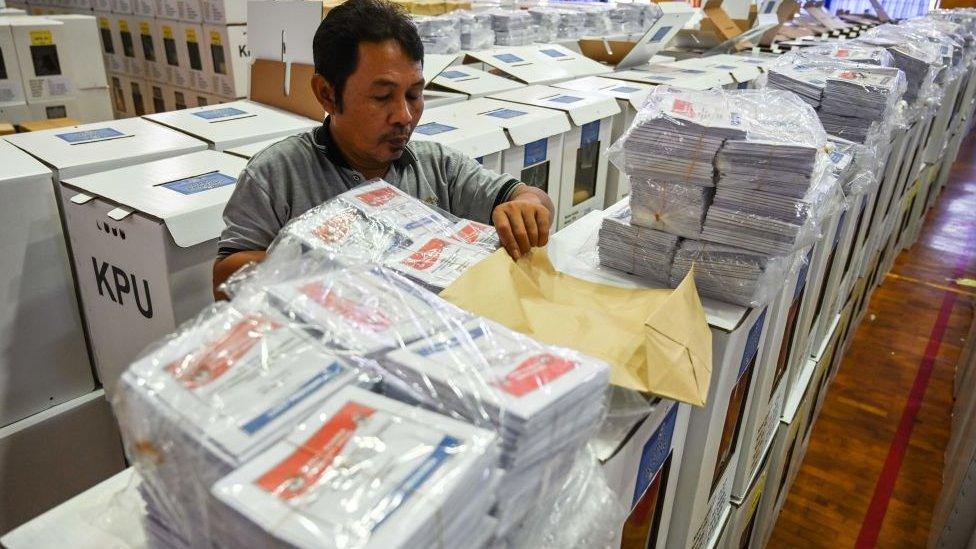
192 million Indonesians are due to vote on 17 April
Whoever wins Indonesia's upcoming election will have to navigate a tricky relationship with China.
Beijing is a crucial player in the country's economic growth but increasingly unpopular with voters.
Indonesia's economy is South East Asia's largest. It has a population of 250 million and an average annual growth rate of about 5%.
By 2050 it is expected to be the fourth largest economy in the world, after China, India and the United States, according to PwC , external.
But analysts routinely say that Indonesia isn't punching its weight, because it's been plagued by decades of under-investment in infrastructure, as well as suffering from corruption and red tape.
So, for the 193 million going to the polls next week to choose their next president, economic growth is a key election issue.
But that economic growth isn't going to happen without significant investment in Indonesian infrastructure, which is impeding trade and hindering the country's potential.
Enter China.
Beijing has been keen to develop infrastructure projects in Indonesia, and add it to the growing list of countries that it is investing in for its Belt and Road Initiative.
"Traditionally the biggest sources of international investment in Indonesia have been Japan and Korea," says Tom Lembong, the head of Indonesia's investment co-ordinating board.
"I do have to note that over the last five years China has gone from being the number 13 largest international investor in Indonesia to today to arguably number one."
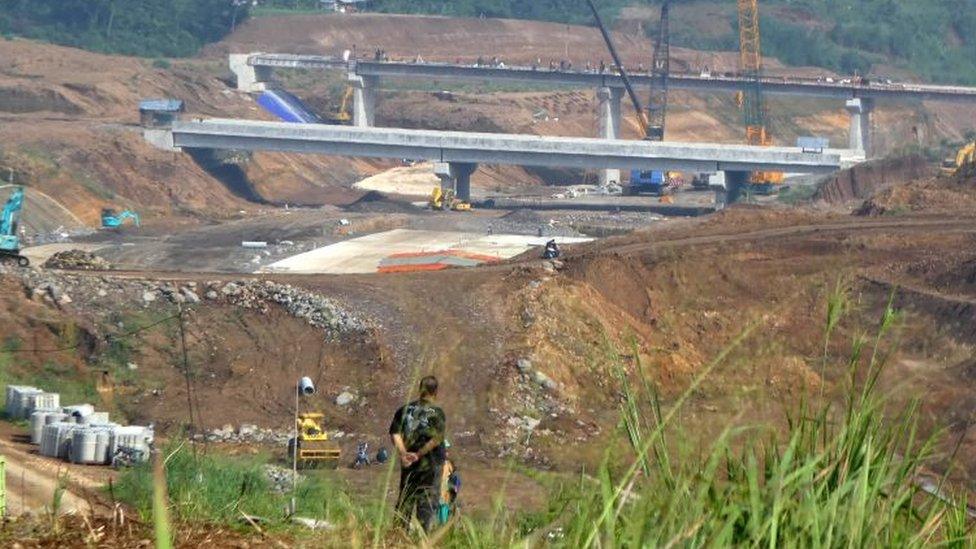
Infrastructure development is crucial for Indonesia's economic future
Although there is no official Belt and Road project underway in the country yet, China has beaten Japan to some high profile infrastructure projects in Indonesia.
But at least one of these projects has been plagued by controversy.
The Jakarta-Bandung high-speed railway, external is a $5.9bn project being built by a Chinese consortium and some Indonesian partners. Reportedly, at least 75% of the project is being funded by China Development Bank.
Once completed, it will be one of South East Asia's first high-speed rail projects, connecting Jakarta to one of Indonesia's top three cities, Bandung.
But it's faced delays because of land acquisition problems, and critics have asked what the point of building a new railway to Bandung is, given there are cheaper options currently available, including travel by bus or existing train services.
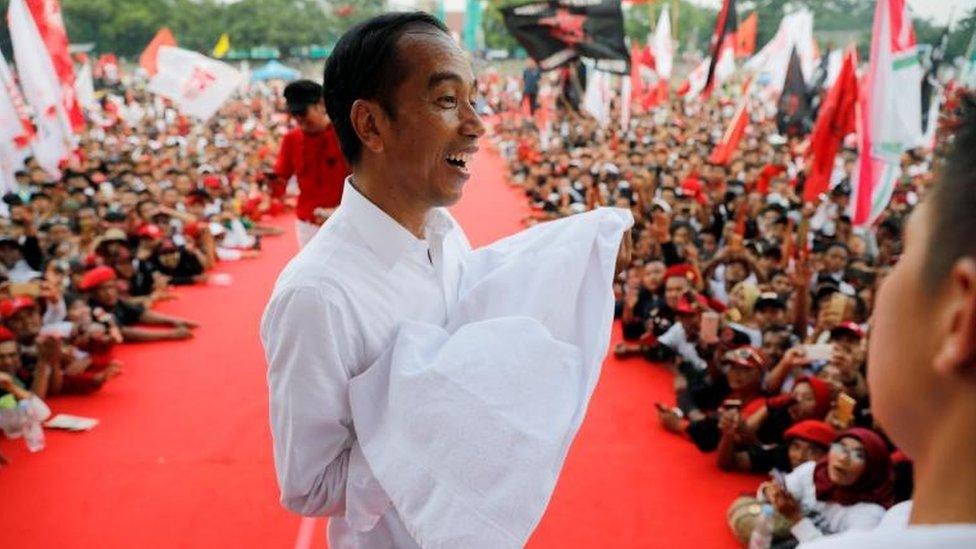
President Joko Widodo has been accused by critics of being too soft on China
Chinese investment has become a contentious issue in this election, as the incumbent Indonesian President, Joko Widodo, has been courting Beijing to invest in infrastructure in the country. This is partly because no one else has the financial might to match China's, and partly because Indonesia is such a cumbersome place to invest that most foreign investors can't be bothered.
But Mr Lembong says foreign investors are attracted to Indonesia, and are willing to deal with some of the difficulties. He also said that in order for Chinese investment to reach its full potential in Indonesia it must be managed properly.
"I think most countries that I'm aware of wish to work closely with China to continue to fine tune and evolve investment to make it less and less controversial over time," he says, comparing Chinese investment with Japanese investment around the world in the 80s and 90s.
"Today Japanese investment around the world has become well accepted and completely uncontroversial. Believe it or not I actually think we are headed to some kind of situation where we will work things out."
But Chinese investment has also become the bogeyman Mr Jokowi's rival Prabowo Subianto has used to undermine him. Mr Prabowo has accused Mr Jokowi of being too soft on China, and allowing millions of Chinese workers in to work on Chinese-funded projects. Mr Prabowo has said if he becomes president, he will review all of Beijing's projects in the country.

That's a sentiment that is widely shared by many Indonesians, who are increasingly wary of Beijing's influence. There has long been a deep-seated resentment of Chinese Indonesians that has at times boiled over into violence, partly driven by an economic jealousy of Chinese Indonesians who many perceive to be wealthier than ethnic Malay Indonesians.
While many of the big Indonesian business families are Chinese Indonesians, the reality is the vast majority of this community are middle class Indonesians, struggling to make ends meet just like everybody else.
This anti-Chinese sentiment has also been exacerbated by what many Indonesians see as encroaching economic and political hegemony by Beijing.
In a recent report by the Pew Research Center, the share of Indonesians who hold favourable views of China has declined over time. In 2018, 53% held favourable views of China, compared with 66% in 2014, external the last Indonesian election.
Still, it is highly likely whoever wins the election will need to depend on China to achieve economic growth rates that can sustain Indonesia's growing population.
The reality is that Indonesia's future success depends on navigating its relationship with Beijing, whatever its candidates may tell their voters.
- Published12 April 2019
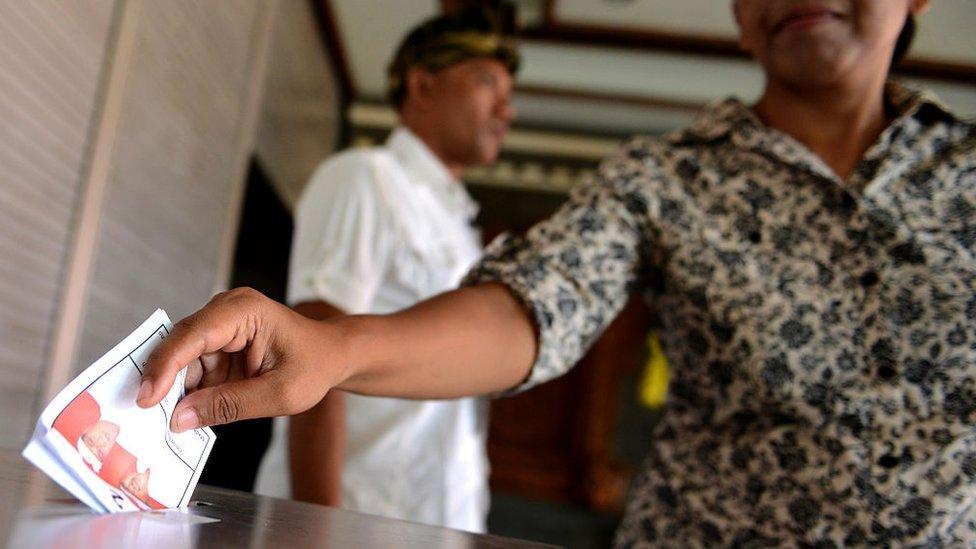
- Published12 April 2019

- Published25 October 2024
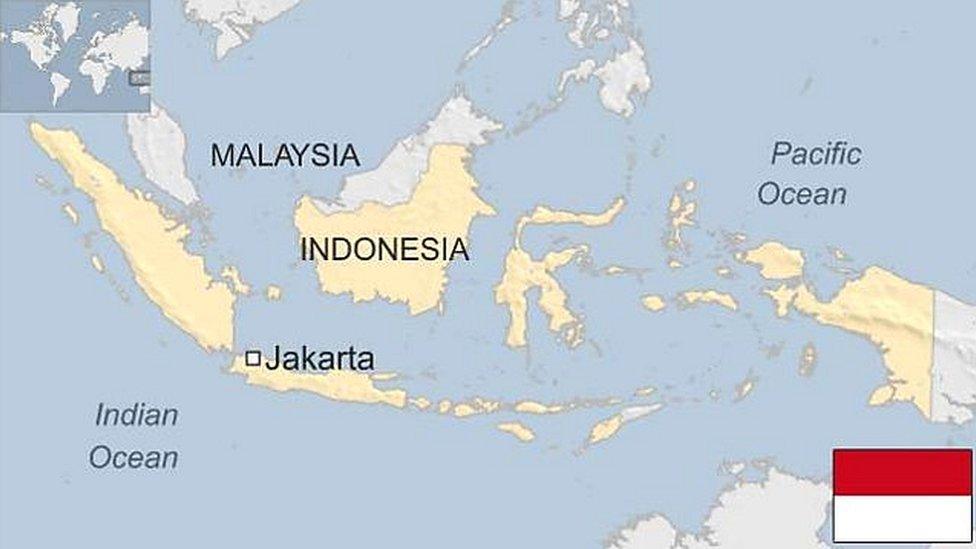
- Published5 October 2017

